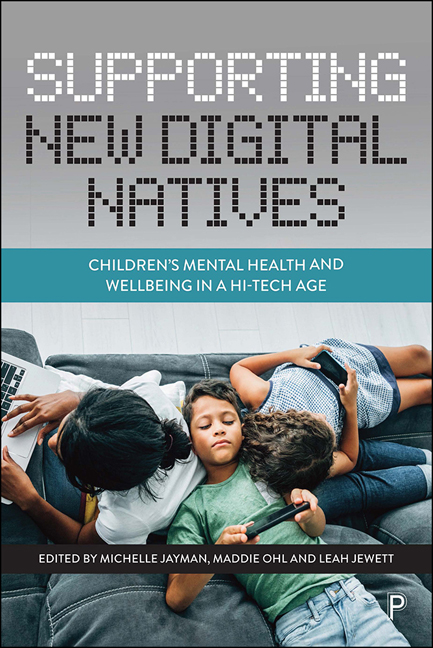Book contents
- Frontmatter
- Dedication
- Contents
- List of figures and tables
- Glossary
- Notes on contributors
- Foreword
- Preface
- 1 Digital lives: growing up in a hi-tech world and staying mentally healthy
- 2 Pyramid Club: building skills for healthy friendships and relationships in a digital age
- 3 Supporting children’s healthy socio-emotional development through play: Book of Beasties – the mental wellness card game
- 4 The School Counselling Partnership: providing support and promoting self-care for school communities
- 5 The Breeze Project: supporting children and young people through Forest School
- 6 Promoting the mental health of girls and young women in the community: the role of Girlguiding
- 7 Supporting families to navigate the changing sex-education landscape: Outspoken Sex Ed
- 8 The Lift Off programme by Red Balloon: online learning and wellbeing support for children who self-exclude from school
- 9 The LifeMosaic project: supporting wellbeing and empowering pupils through design, development and research
- 10 Building better mental wellbeing for children: rebel thinking and innovative practice
- Index
8 - The Lift Off programme by Red Balloon: online learning and wellbeing support for children who self-exclude from school
Published online by Cambridge University Press: 13 May 2022
- Frontmatter
- Dedication
- Contents
- List of figures and tables
- Glossary
- Notes on contributors
- Foreword
- Preface
- 1 Digital lives: growing up in a hi-tech world and staying mentally healthy
- 2 Pyramid Club: building skills for healthy friendships and relationships in a digital age
- 3 Supporting children’s healthy socio-emotional development through play: Book of Beasties – the mental wellness card game
- 4 The School Counselling Partnership: providing support and promoting self-care for school communities
- 5 The Breeze Project: supporting children and young people through Forest School
- 6 Promoting the mental health of girls and young women in the community: the role of Girlguiding
- 7 Supporting families to navigate the changing sex-education landscape: Outspoken Sex Ed
- 8 The Lift Off programme by Red Balloon: online learning and wellbeing support for children who self-exclude from school
- 9 The LifeMosaic project: supporting wellbeing and empowering pupils through design, development and research
- 10 Building better mental wellbeing for children: rebel thinking and innovative practice
- Index
Summary
Red Balloon Learner Centres and online programmes such as Lift Off are dedicated to supporting vulnerable children who become long-term absent from school because of bullying or other trauma, assisting their recovery and bridging their return to mainstream education or other progression pathway. Providing children with educational, wellbeing and social re-engagement programmes as an alternative to school, the charity Red Balloon offers academic lessons, counselling services, therapeutic activities and a supportive community.
Self-exclusion from school and mental wellbeing
The number of pupils in England excluded from both primary and secondary schools has significantly increased since 2010 (Marmot et al, 2020). Permanent exclusions reached their highest point in nearly a decade, with just under 8,000 pupils being expelled in the academic year 2017–18. This equates to around 42 children (aged 5 to 15) per day (Partridge et al, 2020). These grim figures deservedly attract much attention and make headline news; however, less interest is given to the unknown yet significant number of children who self-exclude from mainstream education. There are multiple, often complex, reasons why children ‘refuse’ to attend school. According to Thambirajah et al (2008: 33): ‘School refusal occurs when stress exceeds support, when risks are greater than resilience and when “pull” factors that promote school non-attendance overcome the “push” factors that encourage attendance.’ Research suggests that children self-exclude due to mental health difficulties or after experiencing trauma, and there is a strong link between bullying and absenteeism (Brown et al, 2011). According to Carrie Herbert, founder and chief executive of Red Balloon, these children are liable to fall below the radar and become lost to society (Guardian, 2010). Moreover, despite a lack of reliable data, there are estimated to be between 6,000 and 10,000 pupils self-excluding from mainstream school at any one time.
A body of evidence shows the profound short- and long-term impact that bullying has on children: it can lead to emotional distress, low self-esteem, anxiety, self-harm and suicide (National Academies of Sciences, Engineering and Medicine, 2016). In the UK, the Annual Bullying Survey has been conducted since 2013 by anti-bullying charity Ditch the Label in partnership with secondary schools and colleges.
- Type
- Chapter
- Information
- Supporting New Digital NativesChildren's Mental Health and Wellbeing in a Hi-Tech Age, pp. 137 - 155Publisher: Bristol University PressPrint publication year: 2021



